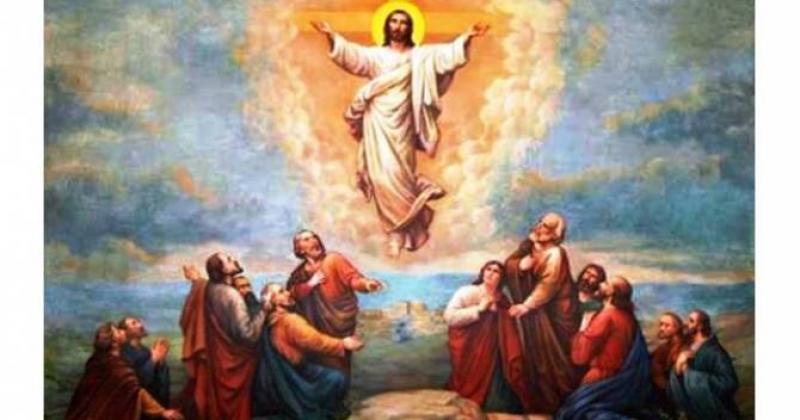What does Ascension of the Lord mean? The event is narrated to us by the Acts of the Apostles (Acts 1:9-11), but also Mark (Mk 16:19) speaks briefly about it at the conclusion of his Gospel, and then Luke (Lk 24:50), who resumes the narration precisely in the Acts, as if to connect the time of Jesus with that of the Church. The two evangelists, after speaking of the Lord’s life, of his death and resurrection, however, limit themselves to a few notes relating to his departure. Forty days after the resurrection, the Risen One puts aside the expectations of those who hope for a political restoration of Israel, takes the Disciples to Bethany, reminds them that they will be witness to him in Jerusalem, Judea and Samaria and to the ends of the earth, then "he was taken up before their very eyes," (Acts 1:11).
With these last suggestive words, the historical time of Jesus among us ends. Sadness or perplexity among the Disciples? Entering the human heart is always difficult. In truth, we note one last comforting blessing from the Lord, who, before evading their gaze, brings consolation and vigour: now they can return "to Jerusalem with great joy" (Lk 24:52) by beginning their witness to Jesus. As Benedict XVI writes in Jesus of Nazareth, with the Ascension the presence of the Risen One is no longer spatial, but divine; Jesus does not go somewhere, but enters the Trinitarian communion which allows him to be present at the same time, but in a different way, alongside us; his therefore becomes a “return” in a new form; in fact, says Saint Paul, we no longer know him according to the flesh (cf. 2 Cor 5:16), but according to faith and baptismal grace.
Even the Church, with this liturgical feast, concludes the cycle of events related to the life of the Lord after having retraced them from the incarnation to death / resurrection. The liturgical time that will follow will be dedicated to reflection on the work and preaching of Jesus, to the birth of the Church (Pentecost), to the great mysteries of the faith (Holy Trinity, Corpus Christi, Kingship of Christ), to the memory of Mary and of the Saints, to the events that made the Church grow by the impulse of the Holy Spirit (missionary spirit, vocations, religious life, etc.).
Therefore, with the Ascension, Jesus returns to the Father and to the Trinitarian communion bringing with him all human experience, as a true man. This is not a secondary aspect. This “bringing” his humanity, although now glorious, means that Jesus does not renounce anything of what he has lived; nothing. After all, we could say, in an analogical sense, that God “is enriched” by it. Jesus brings his face to the Father, with the request for forgiveness, his generation according to the flesh, his human and religious education, his awareness of life spent in a family, his faith lived in the Jewish tradition, a variety of human relationships: feelings in relation to a mother, a father, friends, countrymen, relatives, women, enemies, Romans, accusers, beneficiaries, Pharisees, priests of the Temple, apostles; he still carries with him the experience of sharing in people's lives: the emotion for the death of his friend Lazarus and for the son of Nain's widow, solidarity for lepers, the struggle to free the tormented from the devil; and then again the sense of hunger, temptation, betrayal, anguish, fear, the closure of hearts and minds towards him; he also brings with him, and forever, the joy in praying that fascinated the Disciples, the intimate joy for those who enjoyed forgiveness, the fervour of the people satiated by the bread, the irrepressible happiness of those who had been cured of excluding infirmities, the gratitude of the poor, admiration for nature: look at the birds of the sky, observe the lilies of the field (see Mt 6:26.28); in short, every aspect of his existence spent among us. Above all, he will have in mind the understanding of pain experienced in his own body: of unjust condemnation, of deepest humiliation, abandonment and that physical torment for the wounds that have never healed, through which he will always implore understanding for us of the Father. Finally, death. He bequeaths us the lesson of experience: love your enemies and pray for your persecutors (cf. Mt 5:44).
Jesus, with the Ascension, concludes his historical experience, but therefore inaugurates a new relationship with us: “And surely I am with you always, to the very end of the age" (Mt 28:20), promising to give "power when the Holy Spirit comes on you" (Acts 1:8). To trust or not to trust? Here faith comes into play. The Church now lives in the light of this promise and this faith in her mission to go and teach all peoples, baptizing them for their incorporation into the divine Trinitarian life bequeathed to her, as an incomparable revelation, as a gift.
When we profess that Jesus has ascended to heaven, we now know that we are faced with a perspective of life different, in which the Risen One preceded us; not the imagined emptiness of a farewell: indeed, says Jesus, “it is for your good that I am going away. Unless I go away, the Advocate will not come to you; but if I go, I will send him to you"(Jn 16:7).
With the Holy Spirit, a new time and a new mission will begin for the Church; as for Mary, the Holy Spirit will make the Church fruitful mother in the joy of motherhood, but also suffering, like any mother for lost children.
Mary and the Church: The same mission to bring Jesus.
